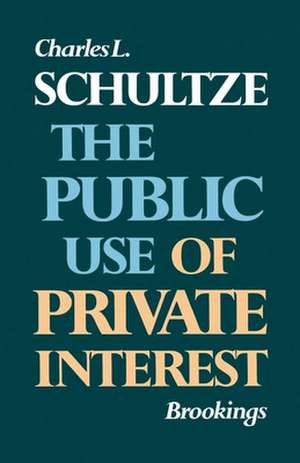The Public Use of Private Interest
Autor Charles L. Schultzeen Limba Engleză Paperback – aug 1977
According to conventional wisdom, government may intervene when private markets fail to provide goods and services that society values. This view has led to the passage of much legislation and the creation of a host of agencies that have attempted, by exquisitely detailed regulations, to compel legislatively defined behavior in a broad range of activities affecting society as a whole—health care, housing, pollution abatement, transportation, to name only a few. Far from achieving the goals of the legislators and regulators, these efforts have been largely ineffective; worse, they have spawned endless litigation and countless administrative proceedings as the individuals and firms on who the regulations fall seek to avoid, or at least soften, their impact. The result has been long delays in determining whether government programs work at all, thwarting of agreed-upon societal aims, and deep skepticism about the power of government to make any difference. Strangely enough in a nation that since its inception has valued both the means and the ends of the private market system, the United States has rarely tried to harness private interests to public goals. Whenever private markets fail to produce some desired good or service (or fail to deter undesirable activity), the remedies proposed have hardly ever involved creating a system of incentives similar to those of the market place so as to make private choice consonant with public virtue. In this revision of the Godkin Lectures presented at Harvard University in November and December 1976, Charles L. Schultze examines the sources of this paradox. He outlines a plan for government intervention that would turn away from the direct "command and control" regulating techniques of the past and rely instead on market-like incentives to encourage people indirectly to take publicly desired actions.
Preț: 198.75 lei
Nou
Puncte Express: 298
Preț estimativ în valută:
38.03€ • 40.67$ • 31.71£
38.03€ • 40.67$ • 31.71£
Carte tipărită la comandă
Livrare economică 17 aprilie-01 mai
Preluare comenzi: 021 569.72.76
Specificații
ISBN-13: 9780815777618
ISBN-10: 0815777612
Pagini: 93
Ilustrații: black & white illustrations
Dimensiuni: 140 x 216 x 9 mm
Greutate: 0.16 kg
Ediția:Revised
Editura: Brookings Institution Press
Colecția Brookings Institution Press
ISBN-10: 0815777612
Pagini: 93
Ilustrații: black & white illustrations
Dimensiuni: 140 x 216 x 9 mm
Greutate: 0.16 kg
Ediția:Revised
Editura: Brookings Institution Press
Colecția Brookings Institution Press
Notă biografică
Charles L. Schultze is a senior fellow in the Economic Studies program at Brookings. He was chairman of the Council of Economic Advisers during the Carter administration and director of the U.S. Bureau of the Budget during the Johnson administra
Descriere
According to conventional wisdom, government may intervene when private markets fail to provide goods and services that society values. This view has led to the passage of much legislation and the creation of a host of agencies that have attempted, by exquisitely detailed regulations, to compel legislatively defined behavior in a broad range of activities affecting society as a whole—health care, housing, pollution abatement, transportation, to name only a few. Far from achieving the goals of the legislators and regulators, these efforts have been largely ineffective; worse, they have spawned endless litigation and countless administrative proceedings as the individuals and firms on who the regulations fall seek to avoid, or at least soften, their impact. The result has been long delays in determining whether government programs work at all, thwarting of agreed-upon societal aims, and deep skepticism about the power of government to make any difference. Strangely enough in a nation that since its inception has valued both the means and the ends of the private market system, the United States has rarely tried to harness private interests to public goals. Whenever private markets fail to produce some desired good or service (or fail to deter undesirable activity), the remedies proposed have hardly ever involved creating a system of incentives similar to those of the market place so as to make private choice consonant with public virtue. In this revision of the Godkin Lectures presented at Harvard University in November and December 1976, Charles L. Schultze examines the sources of this paradox. He outlines a plan for government intervention that would turn away from the direct "command and control" regulating techniques of the past and rely instead on market-like incentives to encourage people indirectly to take publicly desired actions.










